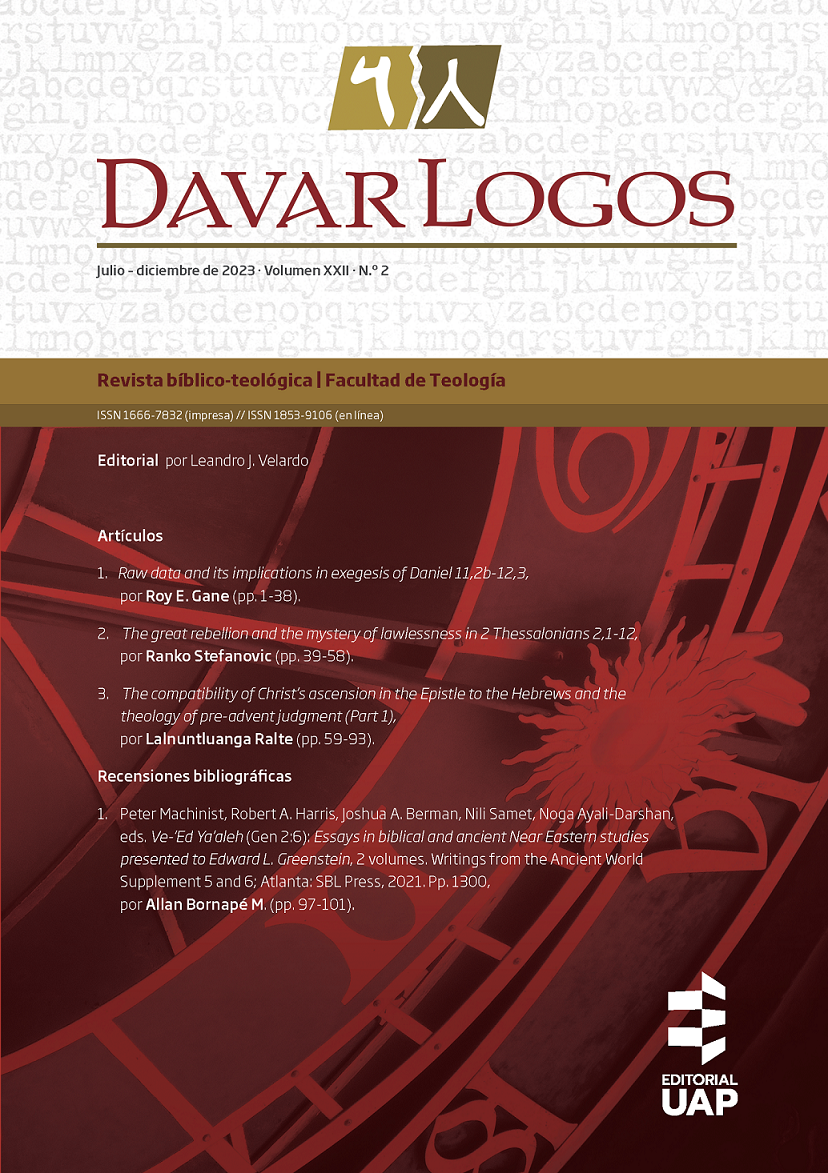La gran rebelión y el misterio de la iniquidad en 2 Tesalonicenses 2,1-12
DOI:
https://doi.org/10.56487/dl.v22i2.1103Palabras clave:
Escatología − Profecía − Apocalíptico − Anticristo − Escritos paulinosResumen
Este artículo ofrece un estudio expositivo de 2 Tesalonicenses 2,1-12, donde Pablo delinea la historia cristiana desde sus días hasta la segunda venida. El apóstol sostiene que la historia cristiana se caracterizará por una gran rebelión espiritual contra Dios organizada por Satanás.
El apóstol señala los papeles centrales de dos entidades en esa gran rebelión, que define en términos de “el hombre de pecado” como el agente de Satanás y “el freno” que durante algún tiempo detiene la plena revelación de esa figura inicua en la escena mundial.
Los comentarios bíblicos ofrecen diversas propuestas sobre la identidad de estas dos entidades.
El presente estudio ofrece una cuidadosa exposición de 2 Tesalonicenses 2,1-12 dentro de su contexto literario y en relación con Daniel 7 y Apocalipsis 13, y ofrece una nueva interpretación de este texto apocalíptico de Pablo.
Descargas
Referencias
Unless otherwise indicated, all Scripture quotations in this article are taken from English
Standard Version
Walter Bauer, Greek-English lexicon of the New Testament and other Early Christian literature
(BDAG), ed. by Frederick W. Danker, 3rd ed. (Chicago, IL: University of Chicago Press,
, 911.
G. K. Beale, 1 and 2 Thessalonians, The IVP New Testament Commentary Series 13 (Downers
Grove, IL: InterVarsity Press, 2003), 202; Gene L. Green, The Letters to the Thessalonians,
The Pillar New Testament Commentary (Grand Rapids, MI: Eerdmans, 2002), 303;
Abraham J. Malherbe, The letters to the Thessalonians: A new translation with introduction and
commentary, The Anchor Bible 32B (New York, NY: Doubleday, 2000), 415
Gordon D. Fee, The first and second letters to the Thessalonians, The New International
Commentary on the New Testament (Grand Rapids, MI: Eerdmans, 2009), 273-275.
On different options of the meaning of the “letter” and evaluation see D. Michael Martin, 1 and
Thessalonians, The New American Commentary (Nashville, TN: B & H, 1995), 225-227.
Beale, 1 and 2 Thessalonians, 199.
See David Williams, 1 and 2 Thessalonians, New International Biblical Commentary 12
(Peabody, MA: Hendrickson, 1992), 131-132; Beale, 1 and 2 Thessalonians, 200.
See F. F. Bruce, 1 and 2 Thessalonians, Word Biblical Commentary 45 (Waco, TX: Word Books,
, 165; Martin, 1 and 2 Thessalonians, 227-228
Robert L. Thomas, 2 Thessalonians, The Expositor’s Bible Commentary (Grand Rapids, MI:
Zondervan, 2005), 12:464.
Fee, The first and second letters to the Thessalonians, 273.
Bauer, Greek-English lexicon, 345.
The clause, “that day will not come” is not found in the Greek text but is appropriately supplied
by translators.
Bauer, Greek-English lexicon, 120
Josephus used the word with reference to political rebellion of the Jewish revolt against the
Romans (Vita 43); Jewish Antiquities 13.219; Against Apion 1.135; also 1 Esdras 2,23. See
further Henry G. Liddell and Robert Scott, A Greek-English lexicon, 8th ed. (Oxford, GB:
Clarendon Press, 1985), 218.
Thomas, “2 Thessalonians,” 12:465.
Williams, 1 and 2 Thessalonians, 123.
See Bruce M. Metzger, A textual commentary on the Greek New Testament, 3rd ed. (New York,
NY: United Bible Societies, 1975), 635
Seventh-day adventist Bible commentary, 2nd ed., ed. by F. D. Nichol (Washington, DC: Review
and Herald, 1980), 6:270.
Fee, The first and second letters to the Thessalonians, 282, footnote 48.
Bauer, Greek-English lexicon, 112.
Fee, The first and second letters to the Thessalonians, 282; also footnote 48.
Bauer, Greek-English lexicon, 127.
Green, The letters to the Thessalonians, 309
Also “the sons of the pit” in Dead Sea Scrolls (Damascus Document [CD] 6.15; 13.14).
Jeffrey A. D. Weima, 1-2 Thessalonians, Baker Exegetical Commentary on the New Testament
(Grand Rapids, MI: Baker, 2014), 515.
Williams, 1 and 2 Thessalonians, 125.
See Ceslas Spicq, Theological lexicon of the New Testament (Peabody, MA: Hendrickson, 1994),
:129-130.
E.g., 1 Clement 51:1; Martyrdom of Polycarp, 17:1
Weima, 1-2 Thessalonians, 516-517.
See Beale, 1 and 2 Thessalonians, 206.
Bauer, Greek-English lexicon, 108.
Beale, 1 and 2 Thessalonians, 209-210.
See Bruce, 1 and 2 Thessalonians, 180-181.
See Psalms of Solomon 17:11, 18.
See Bruce, 1 and 2 Thessalonians, 180.
See Philip W. Comfort, 1 and 2 Thessalonians, Cornerstone Biblical Commentary 16 (Carol
Stream: Tyndale, 2008), 400.
See Gary S. Shogren, 1 and 2 Thessalonians, Zondervan Exegetical Commentary on the New
Testament (Grand Rapids, MI: Zondervan, 2012), 282-283; Anthony A Hoekema, The Bible
and the future (Grand Rapids, MI: Eerdmans, 1979), 161-162
Bauer, Greek-English lexicon, 532.
Fee, The first and second letters to the Thessalonians, 288.
Green, The letters to the Thessalonians, 317.
For the list of different proposals and evaluation see I. Howard Marshall, 1 and 2 Thessalonians,
Century Bible Commentary (Grand Rapids, MI: Eerdmans, 1983), 196-200; Beale, 1 and 2
Thessalonians, 214-216.
Leon Morris, The first and second Epistles to the Thessalonians, The New International
Commentary on the New Testament, 2nd ed. (Grand Rapids, MI: Eerdmans, 1991), 228.
Morris, The First and Second Epistles to the Thessalonians, 221
See Manfred T. Brauch, Hard Sayings of Paul (Downers Grove, IL: Intervarsity Press,
, 245-246
On the concept of the Antichrist in the Bible and the development of the concept in Christian
history see Bruce, 1 and 2 Thessalonians, 179-188.
Charles A. Wanamaker, The Epistles to the Thessalonians, The New International Greek
Testament Commentary (Grand Rapids, MI: Eerdmans, 1990), 259; Malherbe, The Letters to
the Thessalonians, 425
See same concept is found in the Jewish extra-biblical writing: 4 Ezra 13,10-11; 1 Enoch 62,2;
Ps. of Solomon 17,24.35.
Wanamaker, The Epistles to the Thessalonians, 261
William Hendriksen, Commentary on II Thessalonians, New Testament Commentary (Grand
Rapids, MI: Eerdmans, 1990), 186.
See also Ps 81,11-12; 1 Kings 22,23; Ezek 14,9; Acts 8,42; 14,16.
Bauer, Greek-English lexicon, 2.
Descargas
Publicado
Número
Sección
Licencia
Derechos de autor 2023 DavarLogos

Esta obra está bajo una licencia internacional Creative Commons Atribución-NoComercial-CompartirIgual 4.0.





